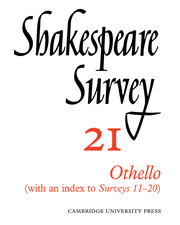Book contents
- Frontmatter
- ‘Othello’: A Retrospect, 1900–67
- The Two Parts of ‘Othello’
- ‘Othello’: A Tragedy Built on a Comic Structure
- ‘Othello’ and the Pattern of Shakespearian Tragedy
- ‘Othello’, ‘Lepanto’ and the Cyprus Wars
- Iago—Vice or Devil?
- Thomas Rymer and ‘Othello’
- Delacroix’s Tragedy of Desdemona
- Verdi’s ‘Otello’: A Shakespearian Masterpiece
- William Hervey and Shakespeare’s Sonnets
- Imagery and Irony in ‘Henry V’
- Shakespeare and the Actors: Notes towards Interpretations
- The Year's Contributions to Shakespearian Study 1 Critical Studies
- 2 Shakespeare’s Life, Times and Stage
- 3 Textual Studies
- Index to Volume 21
- General Index to Volumes 11–20
- Plate Section
Thomas Rymer and ‘Othello’
Published online by Cambridge University Press: 28 March 2007
- Frontmatter
- ‘Othello’: A Retrospect, 1900–67
- The Two Parts of ‘Othello’
- ‘Othello’: A Tragedy Built on a Comic Structure
- ‘Othello’ and the Pattern of Shakespearian Tragedy
- ‘Othello’, ‘Lepanto’ and the Cyprus Wars
- Iago—Vice or Devil?
- Thomas Rymer and ‘Othello’
- Delacroix’s Tragedy of Desdemona
- Verdi’s ‘Otello’: A Shakespearian Masterpiece
- William Hervey and Shakespeare’s Sonnets
- Imagery and Irony in ‘Henry V’
- Shakespeare and the Actors: Notes towards Interpretations
- The Year's Contributions to Shakespearian Study 1 Critical Studies
- 2 Shakespeare’s Life, Times and Stage
- 3 Textual Studies
- Index to Volume 21
- General Index to Volumes 11–20
- Plate Section
Summary
Rymer’s celebrated critique of Othello contains a large number of difficult and important problems. It is part of a European critical debate about the nature of drama and it was this debate, dormant in England for over a hundred years, that T. S. Eliot was trying to revive when he remarked, in the course of one of his essays, ‘I have never, by the way, seen a cogent refutation of Thomas Rymer’s objections to Othello ’. Eliot saw the importance of the debate but his own remarks rather conceal the problem. Without saying that he himself considers the objections valid he leaves his reader to assume that objections which were first published in 1692/3 and have not yet been answered, must be fairly damaging. As Rymer’s most recent editor, Curt A. Zimansky, says
His attack on Othello remains a challenge since the attacks on probability seem valid and the play does raise special problems of moral and decorum.
If Rymer's views are an important part of a vital critical argument it is essential to understand exactly what the argument is about.
- Type
- Chapter
- Information
- Shakespeare Survey , pp. 67 - 78Publisher: Cambridge University PressPrint publication year: 1969

